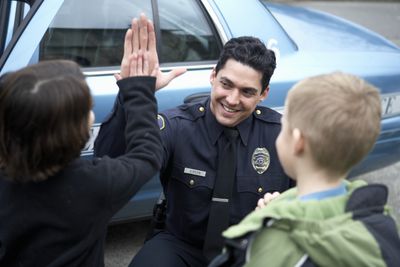In today’s world, it is critical that law enforcement personnel have the interpersonal skills needed to communicate effectively with their peers, supervisors, subordinates, community members, other law enforcement, government, private organizations, and the courts. Communication skills are crucial especially when investigating crimes, de-escalating situations, building trust with those in the communities they serve, writing internal documents, crime reports and for those who aspire to assume leadership positions within a law enforcement organization.

Secret to Success
Talk with any top leader in law enforcement, and you will find them citing communication skills as the main ingredient to their success. Law enforcement officers who build their communication skills toolbox are the most effective because they understand how to communicate with people from different backgrounds under a host of different circumstances. Communication skills are used by L.E. leaders to build trust, transparency, and create a feeling of respect and empathy with employees, the community, and while testifying in court.
L.E. leaders often cite their ability to relate to others was because of the communication skills they developed. L.E. leaders should consider as many channels as possible to connect to employees and residents in order to become even stronger leaders in these challenging times law enforcement is facing.
Language Barriers and Better Communication
Being able to relate to people from diverse backgrounds is crucial for any law enforcement professional. Depending on the community you serve, you may run into hundreds if not thousands of people from multiple cultures. Learning other languages can be extremely beneficial because it can be hard enough to communicate with suspects, victims, and witnesses who speak the same language, but now add a language barrier. James Anderson, the Director of the RAND Institute’s Justice Policy Program, told Fox News, “Essentially, a police department’s ability to build trust with an ethnic community is difficult if you literally can’t talk to them.” Now, multiply this by the hundreds if not thousands of other languages spoken in an individual community. Communication is crucial for a police officer’s success.
Communication is Essential for De-Escalation
The way police officers talk to and with people is critical to help change individual and public perceptions and improve relationships with the community. It is no secret that a level of severe mistrust, anxiety, and tension exists among many members of the public and law enforcement. Ever since the incidents that began with a police shooting in Ferguson, Missouri, and several other high profile incidents throughout the country, police departments have been focused on de-escalation strategies in training environments, and when making arrests and simply interacting with members of their communities. L.E. leaders have always known that having good communication skills, used the right way, work during almost any situation. Edwin Pantoja, a 27-year police veteran, and founder of Force Effects Training has held many interviews, and says that “Officers who are trained and efficient in verbal communications and basic take-down techniques rarely receive excessive use-of-force complaints.” De-escalation does just that, utilizing effective communication skills to reduce the use of force incidents and the number of physical altercations between police officers and the public.
Learning to communicate with people of different populations; experiences, or any other issues is not an easy thing to do. Police officers and police organizations should consider communication skills as one of the most important skills they should learn and teach in order to be more effective in the communities they serve.
The Press of Atlantic City (2016). Law enforcement agencies work to bolster bilingual officers officers, but it’s not that easy. Fox News. Retrieved from
https://www.foxnews.com/world/law-enforcement-agencies-work-to-bolster-bilingual-officers-but-its-not-that-easy
Pantoja, E. (2016, March 21). Better officer training would prevent excessive use of force. USA Today. Retrieved from
https://www.usatoday.com/story/opinion/policing/spotlight/2016/03/21/police-training-use-of-force/82102286/

6 Responses to Police Need Communication Skills to be Effective Leaders in their Organizations and Communities